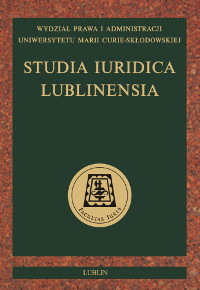Zasada dobrej wiary w prawie międzynarodowym
The Principle of Good Faith in the International Law
Author(s): Edyta LisSubject(s): Law, Constitution, Jurisprudence, International Law
Published by: Wydawnictwo Naukowe Uniwersytetu Marii Curie-Sklodowskiej
Keywords: good faith; general principles of law; principles of international law; treaties; abuse of rights; estoppel; negotiations
Summary/Abstract: The purpose of this article was to present one of the most fundamental principles of international law. According to Art. 38 (1) (c) of the Statute of ICJ, the principle of good faith is a general principle of law recognized by civilized nations and accordingly is one of the formal sources of international law. Undoubtedly, there are still controversies regarding its nature, meaning, content and scope. It should be emphasized that it is impossible to settle one, generally accepted, definition of good faith because it is rather an ambiguous notion. The principle of good faith is applied in many areas of international law and is of great importance. The most relevant in this area is the law of the treaties. The principle of good faith is in use in the law of the treaties from formation of the treaty to its extinction. This principle covers also a narrower doctrine of “abuse of rights”, which is probably one of the most disputable aspects of this principle. The realization of the principle of good faith is well established in the principle of estoppel. What is more, the principle of good faith is also applied in the process of negotiation. Good faith performs intermediary function between rules and principles. Furthermore, it appoints the way of observance of the existing rules of international law and limits a manner of its execution.
Journal: Studia Iuridica Lublinensia
- Issue Year: 25/2016
- Issue No: 1
- Page Range: 17-46
- Page Count: 30
- Language: Polish

